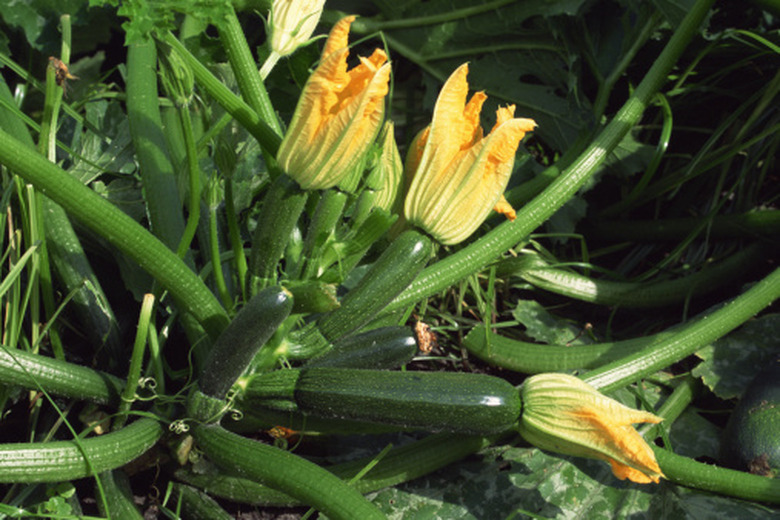Should I Trim Back The Leaves If My Zucchini Is Not Growing Very Big?
While it's more common to have bumper crops of fast-growing zucchini (Cucurbita pepo), some factors can slow down the growth of your annual zucchini or make the plant produce small fruit. For most summer squash, like zucchini, small, young zucchini are more tender and flavorful, but if you want larger zucchini for stuffing, there are some things to do to ensure your zucchini grow well. Trimming the leaves is not one of those things.
Leave the Leaves Alone
The leaves are the food manufacturers for the plant. The large, abundant leaves on a zucchini plant provide shade and keep out weeds by blocking sunlight from reaching the soil and providing nourishment for the weeds. If you cut off the leaves, your zucchini loses its source of fuel, and may slow its growth. Don't bother your zucchini's leaves and look to other ways to improve growth.
- While it's more common to have bumper crops of fast-growing zucchini (Cucurbita pepo), some factors can slow down the growth of your annual zucchini or make the plant produce small fruit.
Poor Pollination
The most common reason for tiny zucchini that drop off the plant is poor pollination. Bees may not be visiting your garden due to weather extremes or because you've used insecticides. If a lack of bees in your area are keeping your zucchini from growing to their full potential, you need to hand pollinate the plants. Pull off the male flowers. which have a long, thin, straight stem at the base, and touch the center of it to the centers of the female flowers that appear a day later and have a bulbous growth at their bases.
Fertilizer Fouls
Too much or too little fertilizer can cause your zucchini to not grow as large as you want. If you over-fertilize, the plant produces more leaves instead of concentrating its growth on the zucchini, but this does not mean that you need to remove those leaves. Because zucchini plants grow quickly, they are heavy feeders, which means if you don't give them enough fertilizer, their growth and the plant's yield can suffer. Both of these cases can be remedied by improving your fertilization techniques, quantities and method.
- The most common reason for tiny zucchini that drop off the plant is poor pollination.
- Because zucchini plants grow quickly, they are heavy feeders, which means if you don't give them enough fertilizer, their growth and the plant's yield can suffer.
When you plant the zucchini, sprinkle 1 tablespoon per hill of a fertilizer that has more potassium and phosphorous in it than nitrogen, for instance a 6-10-10. One week after the blooms appear, apply 1 tablespoon of pure nitrogen fertilizer next to the plants, and repeat this side dressing three weeks later to ensure the proper amount of nitrogen in the soil as the zucchini are growing larger and require more nitrogen.
Watering Woes
Water stress may impact the size of your zucchini. This usually occurs when an exceptionally dry period is followed by heavy watering. Whether you just went out of town for a week and could not water your garden or if you forgot, these fluctuations in moisture can create small, misshapen fruit on the zucchini bush. Water your zucchinis weekly so the soil feels moist down 6 to 8 inches below the surface, but don't get water on the leaves, which can spread diseases. Drip irrigation is the best as it delivers water straight to where the zucchini needs it, and you can get under the leaves, which help to conserve moisture in the soil by blocking the sun from the soil, which is another reason to leave the leaves on the plant.
- When you plant the zucchini, sprinkle 1 tablespoon per hill of a fertilizer that has more potassium and phosphorous in it than nitrogen, for instance a 6-10-10.
- One week after the blooms appear, apply 1 tablespoon of pure nitrogen fertilizer next to the plants, and repeat this side dressing three weeks later to ensure the proper amount of nitrogen in the soil as the zucchini are growing larger and require more nitrogen.
References
- Bonnie Plants: Growing Squash
- University of California Cooperative Extension Master Gardeners: Summer Squash
- Purdue University Cooperative Extension Service: Growing Cucumbers, Melon, Squash, Pumpkins and Gourds
- Bonnie Plants: The Basics of Fertilizing
- Utah State University Cooperative Extension: High Tunnel Summer Squash Production
